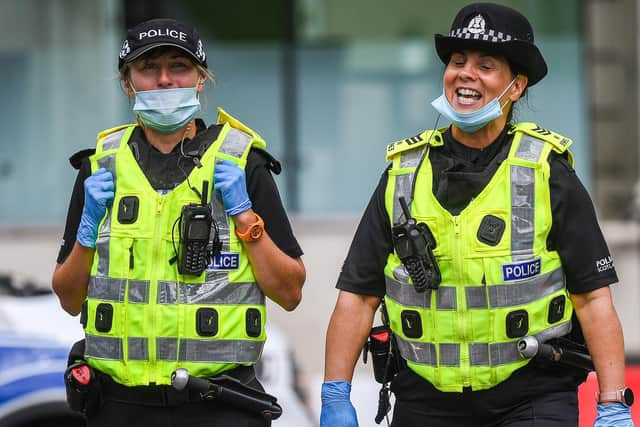Former Scottish deputy police chief warns of 'winter of discontent' fuelled by Covid
Tom Wood – a former deputy chief constable and director of of operations for Lothian and Borders Police - said that public order deployments by the police had risen sharply in the last year with serious incidents arising at anti-racist demonstrations and climate change protests..
This, combined with the prospect of a winter of local lockdowns and a mood that is already in many places “resentful and rebellious”, is likely to put a severe strain on Police Scotland, he said.
Advertisement
Hide AdAdvertisement
Hide AdWriting in The Scotsman, the retired police chief said that the force had so far been able to deploy sufficient resources quickly and effectively to deal with public order threats, but growing problems and significant funding pressures would make that increasingly difficult.


The warning comes after the Scottish government published details of a new five-level alert system of Covid-19 restrictions that will allow them to impose different restrictions in local areas, depending on the prevalence of the infection.
The new system, which adds two levels to the three tiers used in England, will come into force from Monday 2 November.
Recent figures indicated that officers responded to hundreds of house parties across Scotland in just one weekend, as new restrictions forcing hospitality venues to close by 10pm were enforced.


Analysis suggested house parties were being held in every community and age group across the country.
Mr Wood said: "If the escalation of violence continues or increasing numbers ignore Covid restrictions, the old model of policing will come under increasing strain.
"Fortunately, so far, there are only a small minority of miscreants and Covidiots – the ones who won’t take a telling. They have always been with us. Were it otherwise, there would be little need for a police service at all.
"The temperature has risen to the extent that once benign public events, marches and demonstrations now regularly have an explosive element.
Advertisement
Hide AdAdvertisement
Hide Ad"It only takes a few extremists in a crowd to spark trouble. We have seen it in recent anti-racist demonstrations and climate change protests. Police public order deployments have risen sharply in the last year.
"And then along came Covid and the severe restrictions that have been imposed on our freedoms. Now over six months in, and facing a long winter of lockdowns, the mood in many places is resentful and rebellious. A mixture of being fed-up, frustrated, and fearful makes for a combustible combination."
The latest official statistics on crimes recorded by the police under coronavirus legislation showed that 189 crimes took place in September. This is up from just 21 recorded in August, after a gradual drop since April.
Mr Wood blamed a “toxic” political divide on both sides of the border and social media giving a forum to “the lunatic fringe” for fuelling intolerance, and warned additional resources could be needed to meet demand.
"For one thing, the toxic political divide on both sides of the border has polarised and coarsened debate, with social media dripping unfiltered poison to an extent never seen before,” he said.
"This does not signify a change in human behaviour, the lunatic fringe has always been there – they just didn’t have an unfiltered public forum before. It all adds up to mean that the coming months could be a severe test of our traditional policing model."
"Policing by consent is the very foundation of our policing system, that allows a single-tier service to operate without a National Guard or a Garda Civil to back it up.
"There are over 300 members of the public for every police man or woman in Scotland – policing by consent is not just desirable, it’s a cold, hard necessity. Policing by consent means we all have a responsibility to help to keep the peace."
Advertisement
Hide AdAdvertisement
Hide AdStark figures have revealed an increase in violence against officers in the first quarter of this year. Figures from August showed police officers are attacked on average 20 times a day. In the first quarter of this year, before Covid, there were more than 1,700 attacks on police, a rise of 23 per cent on a five-year average.
The growing pressure on frontline officers comes amid decimated budgets, as the latest figures revealed the force was hit this year was hit by a £15 million black hole due as a result of the impact of Covid-19 on income thanks to the cost of PPE.
Chief financial officer James Gray told the Justice Sub-Committee on Policing in Holyrood last month the force budget had been hit by £7m worth of pressure due to Covid-19, including £8m in lost income from not policing events such as football matches, music concerts, and other large sporting and cultural events.
Scottish Conservative justice spokesman Liam Kerr said: “The last thing we need is our brave officers on the frontline having to deal with an increase in disobedient behaviour.
“If there are any signs of that occurring, the SNP must ensure that our police officers are fully resourced to tackle those who flout any guidelines or rules.
“Ultimately clear communication will be key to ensuring that everyone remains committed to fighting the virus.”
Deputy Chief Constable Will Kerr said: "It is clear that 2021 will undoubtedly be a busy year for Police Scotland – starting with the UK’s exit from the EU, ending with COP26, and with a range of key events in between.
"However, the busier and more challenging the environment, the more important it is to ensure that the tone and style of policing reflects the critical need to maintain public trust and confidence.
Advertisement
Hide AdAdvertisement
Hide Ad"That need to maintain public trust and consent has been the core foundation of Police Scotland’s approach to policing the pandemic over the past seven months. Recent figures highlighted public confidence in Police Scotland has risen by around 20 per cent because of the way our officers and staff have carried out their duties with common sense and courtesy.
"Across the country we continue to see strong co-operation and high levels of compliance from our communities as we collectively tackle the spread of the virus, despite seven months of restrictions affecting people's lives in so many different ways. We value that support, and will never take it for granted.
"The strong relationship between policing and the people of Scotland - founded on mutual respect - and the capacity and operational flexibility of a single national police service, are strong foundations for what will undoubtedly be a busy year.
"However, there remains a collective responsibility on us all, when responding to events over the coming year to continue to use temperate and responsible language and behaviour.”
A message from the Editor:
Thank you for reading this article. We're more reliant on your support than ever as the shift in consumer habits brought about by coronavirus impacts our advertisers.
If you haven't already, please consider supporting our trusted, fact-checked journalism by taking out a digital subscription.